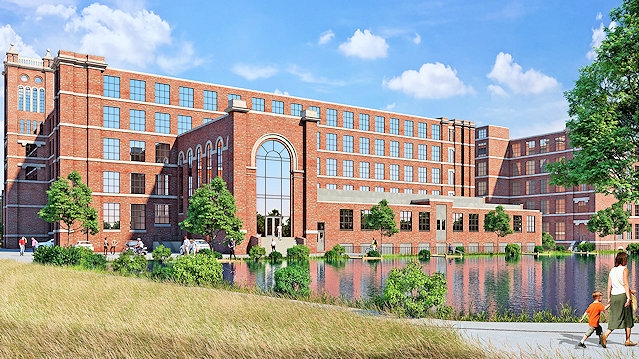Half of Greater Manchester’s historic mills have been lost
Date published: 20 November 2017

£30 million plans submitted to breathe new life into historic Mutual Mills
Greater Manchester has lost almost half of its mills since the 1980s, a new report reveals.
Historic England and YouGov asked the public for their opinions and found that 90% of adults in England believe that historic mills are an important part of the country’s heritage, story and character and 85% do not want to see historic mills demolished and replaced.
A report by the University of Salford, funded by Historic England, has revealed that nearly half of Greater Manchester’s historic mills (45%) have been destroyed since the 1980s. Salford is the borough which has lost the most, with 66% lost over the last 30 years.
There is calculated to be 1,996,597 square metres of vacant floor space in textile mills across Greater Manchester and Lancashire - equivalent to 25,000 new homes. Historic England believes that mills can and should accommodate the North West’s growth needs. Mill buildings are also distinctive, character-filled places which offer a connection between past and future generations.
A study, commissioned by Historic England, explores viable new uses for old mills across the North West.
Catherine Dewar, Historic England’s Planning Director in the North West said:
“With their ability to accommodate wonderful homes, workplaces and cultural spaces, our historic mill buildings deserve a future and should not be destroyed. They helped make us who we are in the north of England and have a profound impact on the physical and cultural landscape.
"Mills have so much to offer in terms of space, character and identity. By shining a light on successful regeneration projects, we hope to inspire others to recognise the potential of our former industrial buildings and start a conversation about their future.”
Greater Manchester Mayor Andy Burnham said: “It is a real shame that half of Greater Manchester’s historic mills have been lost. These buildings are an important part of our industrial legacy – the original Northern Powerhouse. Equally they are an important part of our future, whether that’s creating new jobs for local people by investing in the industries of the future, providing much-needed affordable housing, or transforming these unique spaces into cultural destinations.
"I fully support Historic England’s plea to ensure our remaining mills have a key place in the developing fabric of our region.”
Mill buildings can once again be powerhouses for growth in the 21st century.
http://www.rochdaleonline.co.uk/news-features/2/news-headlines/112095/plans-submitted-to-convert-mutual-mills-in-heywood-into-240-apartments
Successful conversions demonstrate that mills have the capacity to accommodate new and exciting uses, attract investment in area-wide regeneration, create jobs and give rise to the homes and businesses of the future. They can also play a positive role in place-making and local identity, providing inspiring places for people to live, work and relax in.
Historic England’s new publication Engines of Prosperity: new uses for old mills focuses on the North West and showcases successfully repurposed textile mills alongside other potential mill conversion opportunities.
Historic England is seeking to galvanise owners and developers to fulfil the great potential our historic mills can offer and has invited representatives to Manchester’s beautifully converted Chorlton Mill on Wednesday. The North West publication is the second in theEngines of Prosperity series, and follows a 2016 study of West Yorkshire’s textile mills. Both reports were commissioned by Historic England and produced by Cushman & Wakefield and Lathams Architects.
Do you have a story for us?
Let us know by emailing news@rochdaleonline.co.uk
All contact will be treated in confidence.
Most Viewed News Stories
- 1Former councillor and hospital campaigner Jean Ashworth has died
- 2Northern Healthcare opens supported living service in former Rochdale hotel
- 3Middleton school hails another outstanding inspection result
- 4Family event to celebrate Earth Day to be held at Number One Riverside
- 5Rochdale man charged after teenager attacked with substance in Stockport
To contact the Rochdale Online news desk, email news@rochdaleonline.co.uk or visit our news submission page.
To get the latest news on your desktop or mobile, follow Rochdale Online on Twitter and Facebook.


